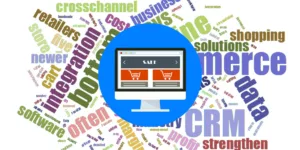Throughout the past two decades, the ecommerce industry has blossomed, and has grown into a multi-trillion-dollar annual industry. Since the late 90s, new online services providers, merchants and marketplaces have emerged, all offering a convenience and a value to the customer. Relying on the data and analytics from the past two decades, retailers are now able to make more profound and well-researched decisions.
When deducing the most important shifts in ecommerce, the customer journey is decidedly at the top of the list. Online retailers now have a toolbox of applications and add-ons that they can use to better analyze data, optimize their sales and marketplace channels, and maximize the conversion potential for each prospective customer. With newer software toolsets like ecommerce CRM that merge many of these solutions into one, retailers now have more powerful customer relationship, analytical and marketing weapons than ever before.
Here are a few reasons why these tools are changing the landscape of internet commerce forever, and for the better.
Harnessing Customer Data in New Ways
In today’s ecommerce world, retailers have to balance their website and primary sales channel, often hosted by a shopping cart service, with their marketplaces, like eBay and Amazon, as well as their social presence. This balancing act can be precarious because these channels don’t really talk to each other.
But newer integrations and API configurations that are found in all-in-one CRM hosts can plug all these channels together. The results are detailed, cross-channel analytics that give retailers a complete look at their online presence, one that spans all their channels, and that enables the ability to better determine and forecast behaviors, trends, buying and returning patterns.
Accessible Cross-Platform Functionality
Accessibility can also be cumbersome. That’s because a retailer has a certain number of team members, and they all require access from their own and their workplace devices, when onsite or on the go. But newer light client applications enable this functionality while also tying the entire team together under one umbrella platform. The result is accessibility and freedom, with the ability to monitor and communicate with other team members from anywhere that the end user has internet access and the light client app installed on the necessary device.
Rethinking Project Management
Project management is an incremental aspect of running any successful business venture, including ecommerce. But few management systems give users access to complete customer histories with cross-channel feeds, nor do they feature embedded calendars, chat functionality or notes. With newer CRM for ecommerce, these features are a reality, and help improve productivity that ultimately benefits the bottom line of the retailer, while also helping to procure better revenue producing campaigns.
Enhancing the Customer Journey
Thriving in today’s ecommerce climate requires a lot of forward thinking and ingenuity. As Inc. Magazine says, it’s all about following the customer journey and creating a memorable experience that cements one’s brand and offerings. Hand-in-hand with this process does also come analytics, the relationship model and effective project management – all key offerings of newer ecommerce CRM solutions.
While CRM systems certainly have many more accolades to achieve in the years yet to come, it’s interesting to see that they have evolved into the electronic commerce era. They could just become one of the most important tools retailers use to improve their bottom line.








